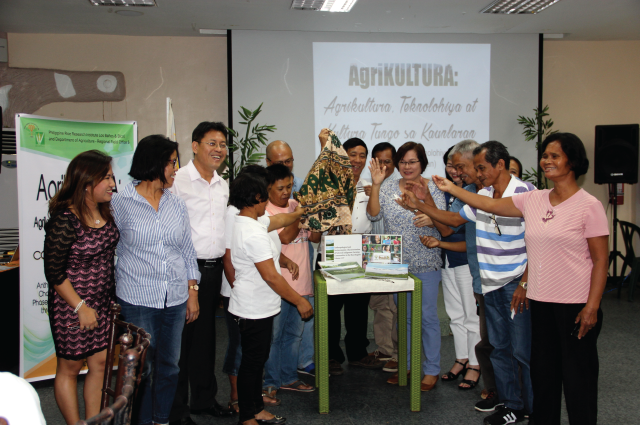 NAGA CITY ― Researchers from PhilRice Los Baños (LB) launched a coffee table book in this City titled Anthropological and socioeconomic characterization of selected indigenous farming communities in the Bicol Region, Oct. 12.
NAGA CITY ― Researchers from PhilRice Los Baños (LB) launched a coffee table book in this City titled Anthropological and socioeconomic characterization of selected indigenous farming communities in the Bicol Region, Oct. 12.
The said publication is a result of a 2012-2014 study Anthropological and Socioeconomic Characterization of Bicol Agta Indigenous Peoples (IPs) conducted by PhilRice LB in collaboration with the Department of Agriculture Regional Field Office (DA-RFO) and the National Commission on Indigenous Peoples (NCIP) in the Bicol region.
The book that comes in four volumes documents farming practices, social conditions, and economic status in four IP communities in Camarines Sur and Albay. It features the following: 1) Tingog Kan San Pedro (Voices of San Pedro); An Makabagong Gatbo (A Modern Gatbo), Nagtatalubong Danao (Growing Danao); and Pagsasabot sa Joroan, Misibis asin Mayong (Understanding Joroan, Misibis, and Mayong).
PhilRice LB embarked on this initiative as part of the station’s project with IPs to better understand the cultures of local communities before implementing development interventions.
“Knowing that the historical development of each IP community is unique, further understanding of their anthropological and socioeconomic conditions is important so we can create appropriate and effective recommendations for development projects in these communities,” said Mario M. Movillon, project lead and chief science research specialist of PhilRice LB.
Primarily, the researchers identified factors that can affect the willingness and ability of indigenous farmers to adopt the Palayamanan®, a diversified farming system being promoted by PhilRice.
The study found that “the communities’ characteristics, locations, influences, and aspirations have affected their way of living and agricultural practices ― exhibiting various degrees of transition towards modernity.”
The book also presents results of anthropological and socioeconomic analysis across all sites that demonstrated different geographical conditions, rice and agri-based farming practices, disposals, market access, traditions, beliefs, and aspirations. These factors will be considered in enhancing the capabilities of the IP farmers through the Palayamanan approach to increase their farm productivity.
“This free publication is written in English, Filipino, and Bicolano to represent international, national, and regional language that can cater to a wider audience,” said Jacqueline O. Canilao, one of the authors.
“We presented this in a reader-friendly manner so people can have a better understanding and appreciation of the ways of living and culture of the IPs in Bicol,” she added.
The book will be available in selected libraries of schools, universities, and agencies such as the NCIP and PhilRice central and branch stations.




